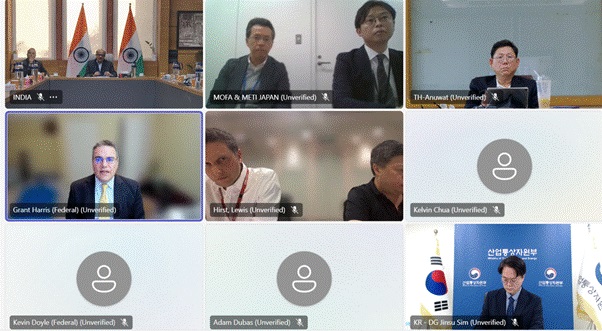India participated today in the 2nd meeting of the Supply Chain Council as vice-chair. India was represented by Shri Rajesh Agrawal, Additional Secretary, Department of Commerce.
The Chair (United States) of SCC highlighted the significant progress made since the last meeting in September 2024 and shared an update on the APT relating to Chemicals, in this efforts are being made to promote greater chemicals trade and diversify sources through various work streams, and enhance international business matchmaking.

Additionally, updates were shared on the Critical Minerals, Semiconductors and Pharma/Healthcare Action Plan Teams, emphasizing collaboration and the development of practical work plans to address supply chain challenges in these sectors.
The lead of the Sub-committee on Logistics and Movement of Goods provided an update relating to establishment of technical standards for cold chain logistics, stressed on the importance of regulatory transparency and active stakeholder engagement.
The lead of the Sub-committee on Data and Analytics expressed satisfaction about the ongoing consultations and the alignment of goals among partners regarding supply chain resilience, highlighting the interest in developing monitoring systems and enhancing data analysis capabilities.
India as Vice Chair, appreciated the ongoing efforts/ initiatives and the potential for tangible outcomes in the coming months. India proposed to host the next in-person meeting of the SCC early next year.
The meeting concluded with updates on the Crisis Response Network and the Labor Rights Advisory Board (established as a part of Pillar II Agreement), underscoring the commitment to enhancing supply chain resilience through collaborative efforts.
In September 2024, the first SCC meeting in Washington led to the formation of Action Plan Teams (APT) focusing on six key areas such as Semiconductors (led by US), Critical Minerals (led by Australia), Chemicals (led by US) and Pharma/Healthcare sector (led by India), two Sub-Committees focusing on Logistics and Movement of Goods (led by New Zealand), and Data and Analytics (led by Singapore).
Out of six key areas identified by the Council as focus areas, India recognizes health care/pharmaceutical sector as very crucial from the perspective of achieving the goal of resilient supply chains in the sector, keeping its criticality. Collaborative efforts such as APT could play a pivotal role in reducing vulnerability on import dependency for Active Pharmaceutical Ingredients (APIs)/medical devices. These efforts are also expected to strengthen our domestic manufacturing though sharing of best practices, technical know-how, technology transfer, up-skilling and re-skilling etc., ensuring that pharmaceutical and healthcare supplies are resilient. India’s leadership in global health is exemplified by the development of the world’s first DNA vaccine for COVID-19. India’s emergence as a hub for affordable, high-quality medicines is truly commendable. India now ranks 3rd in pharmaceutical production by volume and 14th by value.
It is very timely that under IPEF, India has also been elected as the Chair for Action Plan Team on Pharma/Healthcare. Currently, Thailand, Singapore, and New Zealand have joined the APT on Pharma/Healthcare led by India.
